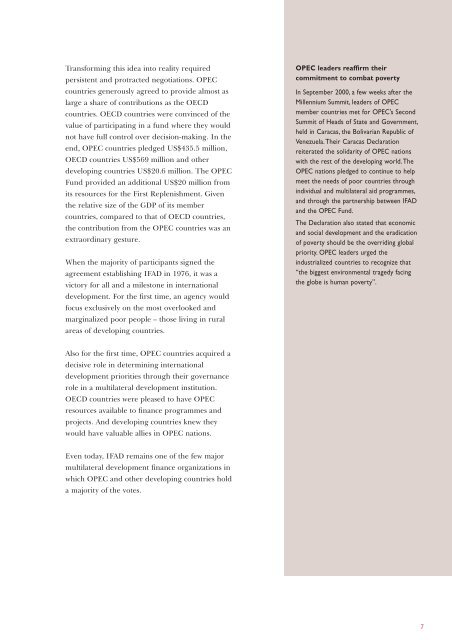A partnership to eradicate rural poverty - IFAD
A partnership to eradicate rural poverty - IFAD
A partnership to eradicate rural poverty - IFAD
Create successful ePaper yourself
Turn your PDF publications into a flip-book with our unique Google optimized e-Paper software.
Transforming this idea in<strong>to</strong> reality required<br />
persistent and protracted negotiations. OPEC<br />
countries generously agreed <strong>to</strong> provide almost as<br />
large a share of contributions as the OECD<br />
countries. OECD countries were convinced of the<br />
value of participating in a fund where they would<br />
not have full control over decision-making. In the<br />
end, OPEC countries pledged US$435.5 million,<br />
OECD countries US$569 million and other<br />
developing countries US$20.6 million. The OPEC<br />
Fund provided an additional US$20 million from<br />
its resources for the First Replenishment. Given<br />
the relative size of the GDP of its member<br />
countries, compared <strong>to</strong> that of OECD countries,<br />
the contribution from the OPEC countries was an<br />
extraordinary gesture.<br />
When the majority of participants signed the<br />
agreement establishing <strong>IFAD</strong> in 1976, it was a<br />
vic<strong>to</strong>ry for all and a miles<strong>to</strong>ne in international<br />
development. For the first time, an agency would<br />
focus exclusively on the most overlooked and<br />
marginalized poor people – those living in <strong>rural</strong><br />
areas of developing countries.<br />
OPEC leaders reaffirm their<br />
commitment <strong>to</strong> combat <strong>poverty</strong><br />
In September 2000, a few weeks after the<br />
Millennium Summit, leaders of OPEC<br />
member countries met for OPEC’s Second<br />
Summit of Heads of State and Government,<br />
held in Caracas, the Bolivarian Republic of<br />
Venezuela.Their Caracas Declaration<br />
reiterated the solidarity of OPEC nations<br />
with the rest of the developing world.The<br />
OPEC nations pledged <strong>to</strong> continue <strong>to</strong> help<br />
meet the needs of poor countries through<br />
individual and multilateral aid programmes,<br />
and through the <strong>partnership</strong> between <strong>IFAD</strong><br />
and the OPEC Fund.<br />
The Declaration also stated that economic<br />
and social development and the eradication<br />
of <strong>poverty</strong> should be the overriding global<br />
priority. OPEC leaders urged the<br />
industrialized countries <strong>to</strong> recognize that<br />
“the biggest environmental tragedy facing<br />
the globe is human <strong>poverty</strong>”.<br />
Also for the first time, OPEC countries acquired a<br />
decisive role in determining international<br />
development priorities through their governance<br />
role in a multilateral development institution.<br />
OECD countries were pleased <strong>to</strong> have OPEC<br />
resources available <strong>to</strong> finance programmes and<br />
projects. And developing countries knew they<br />
would have valuable allies in OPEC nations.<br />
Even <strong>to</strong>day, <strong>IFAD</strong> remains one of the few major<br />
multilateral development finance organizations in<br />
which OPEC and other developing countries hold<br />
a majority of the votes.<br />
7

















